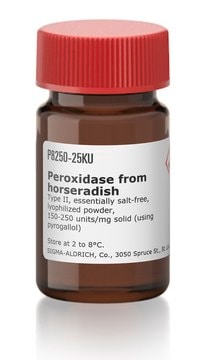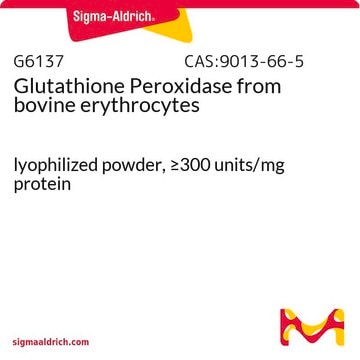S8409
Superoxide Dismutase from bovine liver
ammonium sulfate suspension, 2,000-6,000 units/mg protein (biuret)
Sinónimos:
SOD, Superoxide: superoxide oxidoreductase
About This Item
Productos recomendados
form
ammonium sulfate suspension
Quality Level
specific activity
2,000-6,000 units/mg protein (biuret)
mol wt
32.5 kDa
UniProt accession no.
storage temp.
2-8°C
Gene Information
cow ... SOD1(281495)
¿Está buscando productos similares? Visita Guía de comparación de productos
General description
Superoxide dismutases are a group of low molecular weight metalloproteins present in all aerobic cells of plants, animals, and micro-organisms. They provide protection against damaging reactions with the superoxide radical anion (O2-) by catalyzing its disproportionation into oxygen and hydrogen peroxide.
Application
- for measuring mitochondrial hydrogen peroxide production in skeletal muscle
- as a positive control in Cu(II) binding stability assay
- as a positive control in superoxide dismutase assay
- in a study to assess the inactivation of endothelial-derived relaxing factor by oxidized lipoproteins.
- in a study to investigate the role of hydrogen peroxide in the cytotoxicity of the xanthine/xanthine oxidase system.
Biochem/physiol Actions
Unit Definition
Physical form
Analysis Note
signalword
Danger
hcodes
pcodes
Hazard Classifications
Resp. Sens. 1
Storage Class
10 - Combustible liquids
wgk_germany
WGK 1
flash_point_f
Not applicable
flash_point_c
Not applicable
ppe
Eyeshields, Gloves, multi-purpose combination respirator cartridge (US)
Elija entre una de las versiones más recientes:
Certificados de análisis (COA)
¿No ve la versión correcta?
Si necesita una versión concreta, puede buscar un certificado específico por el número de lote.
¿Ya tiene este producto?
Encuentre la documentación para los productos que ha comprado recientemente en la Biblioteca de documentos.
Los clientes también vieron
Artículos
Instructions for working with enzymes supplied as ammonium sulfate suspensions
Protocolos
Enzymatic Assay of Superoxide Dismutase
Separation of Superoxide dismutase
Chromatograms
application for HPLCNuestro equipo de científicos tiene experiencia en todas las áreas de investigación: Ciencias de la vida, Ciencia de los materiales, Síntesis química, Cromatografía, Analítica y muchas otras.
Póngase en contacto con el Servicio técnico













